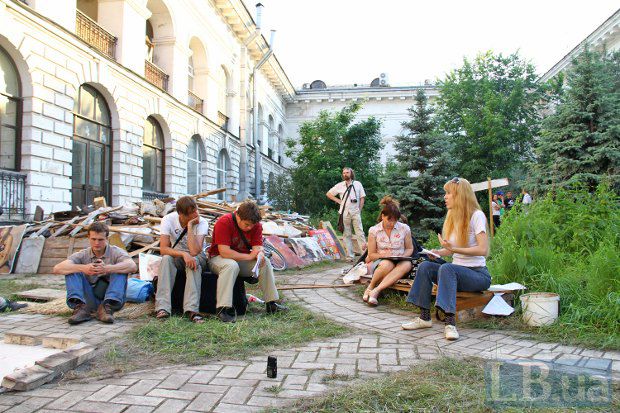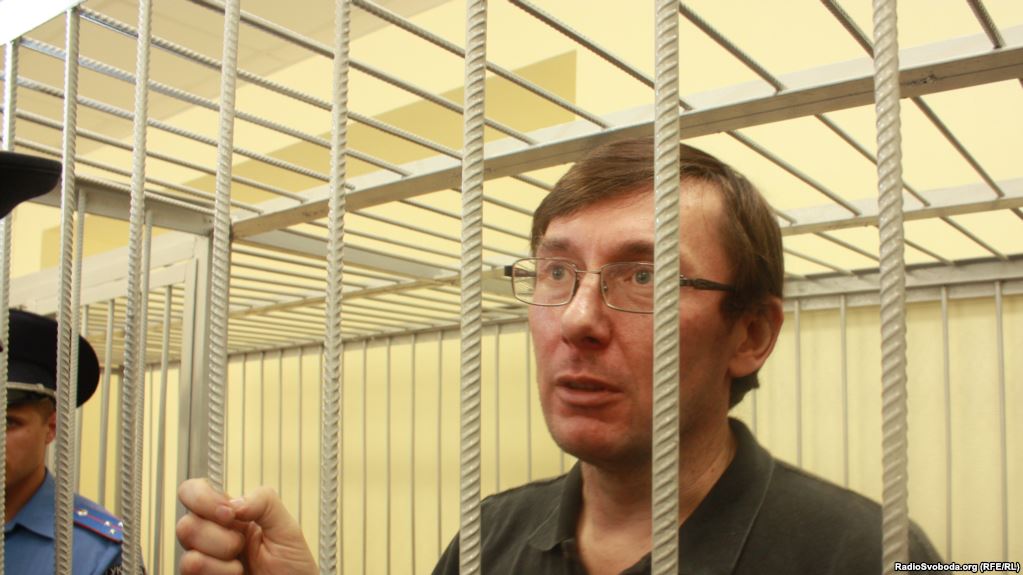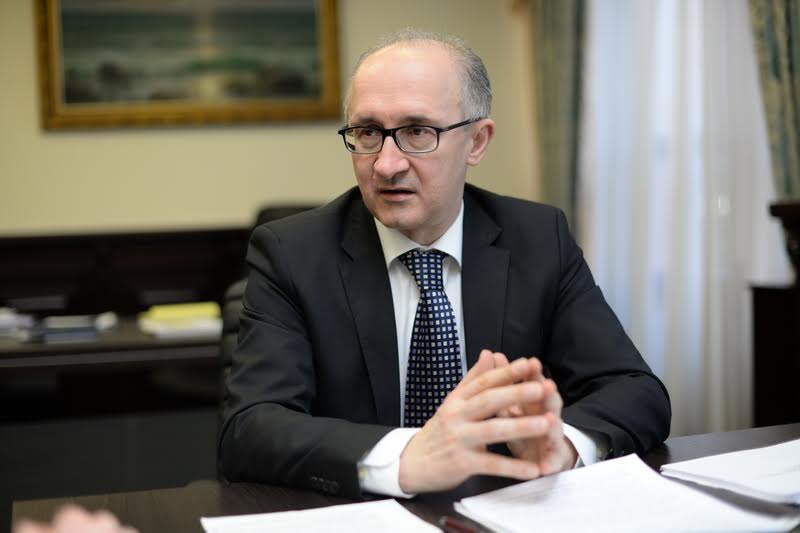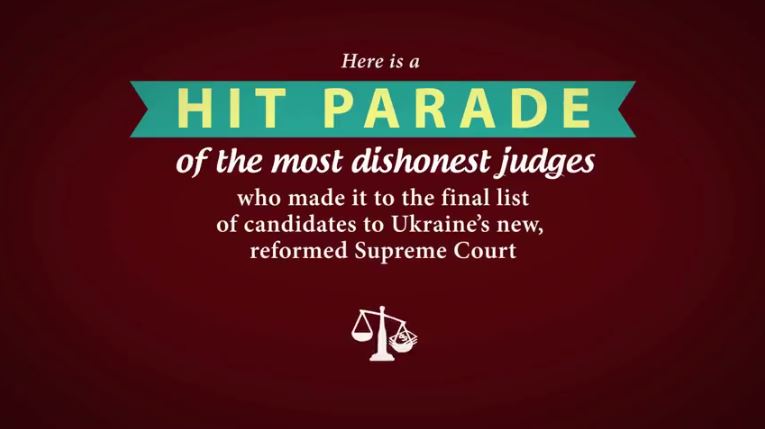Ukrainian justice has a bad reputation. The trust in the judiciary remains critically low - an opinion poll from late 2016 found only 37% of Ukrainians trust the judicial system. After the Euromaidan revolution, Ukraine received the chance to change it. The judicial reform was personally launched by President Petro Poroshenko. Now, the process of forming the key judiciary institution, the Supreme Court, is ongoing. So far the situation does not look bright – 30 out of 120 candidates to it admitted in having bad reputation. However, it still can be changed. The last words in the selection are said by the High Council of Justice and then the president.
Some in Ukraine reckon that a quarter of dishonest judges in the Supreme Court is actually is not a bad result - it could have been worse. However, the cases in which these judges were involved suggest the situation is quite serious.
The professional ethics and integrity of the judges were assessed by the Public Integrity Council. The body was created to assist the High Qualification Commission of Judges in evaluating judges. The Public Integrity Council (PIC) had two kinds of conclusions. First, an “opinion” which means there exist proven facts that the candidate doesn’t fit the criteria. Second, “information,” which casts a shadow on the reputation of a judge, but does not contain evidence of misconduct.
Those 30 in the list received negative opinions, meaning there is evidence of their misconduct. The cases are different – starting from unjustified assets and ending with political prosecution.
Euromaidan Press assembled a hit parade of cases with involvement of the candidates who might receive a life-long ticket to say the final word in all of Ukraine’s judicial disputes in Ukraine’s reformed Supreme Court.
Let's start from number 6.
6. Unjustified assets

There are seven candidates to the Supreme Court whose lifestyle does not correspond to their income. Also there are eight candidates who provided false information in their property declarations.
In his interview with Euromaidan Press, Mykhailo Zhernakov, the Director of DEJURE foundation, member of the Public Integrity Council, and an expert of the Reanimation Package of Reforms, gave this example of an absurd result: “The judge Olha Stupak during the interview [to the PIC] said she can’t prove the origins of the money with which she purchased two apartments.”
Zhernakov emphasizes that the Сonstitution of Ukraine puts the responsibility to prove the origins of assets directly to the judge. The inability to prove it is a reason to fire a judge, not even mentioning appointing to a lifelong post. According to the 6th European Convention, the decisions of such a judge is a gross violation of human rights.
5. A life sentence to solve business problems

In Autumn 2008, the judge Stanislav Holubytskyi
, along with other judges of the Chamber of Criminal Cases of the Lviv Oblast Court of Appeal, sentenced Volodymyr Panasenko to life imprisonment. The reason was an alleged assassination attempt on the director of the market Shuvar. The convict was the deputy head of the chief executive of the above-mentioned market. The allegations were based on the testimony of the executor of the assassination, who at the moment of detention was undergoing treatment for alcoholism in a mental health facility. Moreover, he denied his testimony in the court, referring to pressure from investigators and prosecutors at the interrogation. The decision of the judges to imprison a person for life was based on a mere assumption.
“Recently, blatant facts of judges applying life imprisonment to citizens as a way to resolve conflict relationships in cases of business structures started to appear,” is the way that Nina Karpachova, then Commissioner for Human Rights, referred to the case of Panasenko.
Later experts concluded that Panasenko was condemned illegally.
The PIC stresses that even though the candidate was not a presiding judge in the case, still he did not use his right on expressing an opinion in it, saying that there is reason to assume that the candidate “did not adhere to the standards and principles of behaviour of a judge, and his activities during the position of a judge did not contribute to the establishment of the citizens’ trust in the judiciary.”
4. Gross violation of the right to a fair trial

The 97-year-old granny Maria Bochan humiliated Ukraine’s Supreme Court in the European Court of Human Rights.
Over more than 10 years, the old lady tried to prove her right to her apartment in a private house which was occupied by some man. Several times, the courts of first and second instances made decisions in her favor. However, they were canceled by the Supreme Court. Feeling desperate, she applied to Strasbourg.
The European Court recognized the violation of the woman's right to a fair trial and assigned her a EUR 2,000 compensation.
The decision should have become a reason for the Ukrainian court to reconsider its decision and fix the mistakes. However, the Supreme Court did not see them.
Then the old lady applied to the European Court again. Now, her case was considered by the chamber of the European Court on Human Rights which considers only resonant cases. The decision again was made in favor of the old lady. However, this time the European Court accused judges of the Ukrainian Supreme Court in defying the conclusions of the European Court and ignoring the right of Ukrainian citizens to a fair trial. Also this time the amount of compensation to the granny was EUR 10,000.
Human rights activists stressed that the case was the first decision of the High Chamber of European Court of Human rights on Ukraine.
The new Supreme Court candidate Inna Berdnyk took part in delivering a decision on the case within the board of judges of the Supreme Court.
3. Banning peaceful assemblies

This human rights violation type was a common solution for different problems.
The central area of Kyiv called Podil is a titbit which construction companies are dreaming about. In the very heart of this district stands a historical building called Hostynnyi Dvir, located on the 9,000 square meters. In 2012, a scandal erupted over it. One year earlier, the building was excluded from the list of architectural monuments of Ukraine protected by the state. The company Ukrrestavratsyia bought it and announced that it's going to build a shopping and entertainment center. According to the company, the architecture should have been close to the buildings of XIX century. However, the activists stated that in fact, the company was going to turn it into ordinary glass mall and a parking lot which would turn Podil into the biggest parking place in the center of Kyiv.
To protect the building the activists started to hold different art performances there. In a while, people in camouflage and the notorious Berkut law enforcement unit, which took part in shooting protesters during the Euromaidan Revolution, started attacking the activists. Finally, the building caught fire. Activists accused the developing company of arson.
After the Euromaidan Revolution, the Kyiv city council canceled the decision on giving the land for the reconstruction. In 2015, its status of the architectural monuments was restored.
The company Ukrrestavracyia
involved in the scandal was associated with a proxy of the runaway president Yanukovych.
The Ukrainian judiciary played a key role in the scandal over the building, serving the business interests of certain people. The District Administrative Court of Kyiv with its decision canceled peaceful assemblies, in particular setting tents, kiosks and canopies, on the territory of the building and the nearby territory. The judge Iryna Saprykyna chaired the case of the appeal complaint on the ban. She was responsible for leaving the decision to ban peaceful assemblies against destroying Hostynnyi Dvir in place.
“As a result of ordinary judicial fraud, the prohibition of peaceful protests lasted for years while Hostynnyi Dvir was destroyed,” said the Public Integrity Council in its opinion.
Another candidate to the new Supreme Court, Svitlana Pasichnyk, is also involved in prohibiting peaceful assemblies. In November 2013, the High Administrative Court of Ukraine kept the decisions of courts of first and appeal instances to prohibit peaceful assemblies in the center of Kyiv. The case was related to the public organization Insite. The court justified its decisions with the legislation from Soviet times, ignoring the provisions of the Constitution of Ukraine. The court also ignored the decision of the European Court of Human Rights which said that the legislation dated by 1988 is incompatible with the very essence of freedom of assembly provided by the Constitution of Ukraine.
The opinion of the Public Integrity Council refers to the report of the Kharkiv Human Rights Protection Group which characterized automatic prohibitions of peaceful assemblies to an indefinite number of people as a “shameful practice that contradicts to principles of administrative legal proceedings.”
The candidate Oleksandr Zolotnikov also was admitted in being guided by the legislation of Soviet times, ignoring the Constitution of Ukraine. In 2011, according to this legislation, the Kherson Oblast organization of all-Ukrainian association Batkivshchyna and its leaders were prohibited to held a protest action in Kherson. The case was considered almost 2 years after lodging an appeal. The candidate supported the decision of 2011.
“It's obvious that a candidate fulfilling the duty of every judge to maintain her proper professional level and deepen his knowledge was familiar with general practices, as well as with the rule of law principle. So according to our belief, the use of the decree [of Soviet times] in these legal relationships means to consciously ignore the Constitution and is a manifestation of arbitrariness or gross negligence,” says the Public Integrity Council in its opinion.
2. Cover-ups for judges who prosecuted Euromaidan activists

During Euromaidan revolution, activists were pressured by different sides of Yanukovych’s regime. Starting from the mainstream media which ignored or discredited the gatherings of hundreds of thousands of people (the prejudice created then later played a crucial role in Russia's occupation of Crimea and aggression in Donbas) to the law enforcement, which resulted in a number of victims. to the judiciary, which prosecuted the activists.
There is a number of candidates to the new Supreme Court who canceled the filing of the High Council of Justice on dismissing judges who had arbitrarily taken activists into custody or deprived them of driving rights during the events of the Euromaidan revolution.
Among these candidates are Larysa Moroz, Valentyna Yurchenko, Mykhailo Smokovych,
and Tetiana Strelets.
1. Political Prosecution

A judge making political decisions is even worse than simply a corrupt judge. It means that this judge is ready to serve the regime and that the principles of democracy can't work. Appointing a judge who is ready to persecute those who are opposed to the regime takes away hopes for positive transformations of the country and leads it back to authoritarianism.
We gave the first place of the hit parade to the judges Serhiy Slynko and Viacheslav Nastavnyi.
These judges made the final decision against Yuriy Lutsenko, the current Prosecutor General and former Minister of Interior who was sentenced to jail during the presidency of Viktor Yanukovych.
On February 2012, the Kyiv Pechersk District Court sentenced Lutsenko to 4 years with the deprivation of the right to hold positions related to the implementation of organizational and administrative duties at enterprises, institutions, organizations of all forms of ownership for a term of 3 years, with the confiscation of all the property belonging to him personally and with the deprivation of the 1st rank of a civil servant.
The European Court of Human Rights established that the decision on Lutsenko violated provisions of the European Convention on Human Rights and Fundamental Freedoms.
Lutsenko was released in April 2013, being pardoned by a presidential decree.
In March 2014, after the Euromaidan revolution, the Pechersk Court in Kyiv canceled the decisions on Lutsenko and recognized him a political prisoner. This decision was made because of coming into force the law On the rehabilitation of individuals to comply with the decisions of the European Court of Human Rights.

We do not claim that this hit parade is objective. Its aim is to draw attention to the danger of appointing 30 judges who do not match the criteria of judicial integrity and professional ethics. Sometimes it was hard to identify whether one violation was worse than the other. Also, we mentioned only some cases of judges receiving negative opinions from the Public Integrity Council. There are also examples of the indirect involvement of judges in raiding, illegal decisions on the privatization of state housings, banning video recordings of open judicial hearings, and other cases. For some judges there are several reasons for receiving the negative opinions.
Here is an infographic made by the Reanimation Package of Reforms on the 30 candidates who received negative opinions from PIC.
With these judges of the Supreme Court all attempts to reload judiciary system will be neglected.
The new Supreme Court will consist of four courts of Cassation – administrative, criminal, civil, and commercial (30 candidates from the list for each). The activist described the situation at each Court of cassation.
- The PIC gave negative assessments to ¼ of the judges in the Administrative Court, mostly because of their unjustified assets, participation in political prosecution, and making decisions that were confirmed as violations of human rights. This court makes the final decisions in all the cases where Ukrainians challenge the activities of Ukraine’s branches of power, them being judicial, executive, and legislative.
- The Criminal Court makes the final decisions in the cases that are now investigated by the National Anti-Corruption Bureau. According to the results of the competition, each and every panel that will deal with these corruption cases will have people who have experience in political prosecution.
- In the Commercial Court and Court of Cassation each, ¼ of the judges will have unjustified assets and/or a track record of political prosecution and violation of human rights.
According to the activists, no harm will be done if the 30 dishonest judges will not be appointed: 65 judges enough for the proper functioning of the Supreme Court.
Read also:
- Judiciary reform under threat because of the old new Supreme Court
- Activists: with failed new Supreme Court, we can “forget about democracy and justice” in Ukraine
- “Ukraine finally to have independent judiciary.” Interview with Head of Qualification Commission of Judges
- Will Ukraine finally have a new judiciary? Explained by the Public Integrity Council





